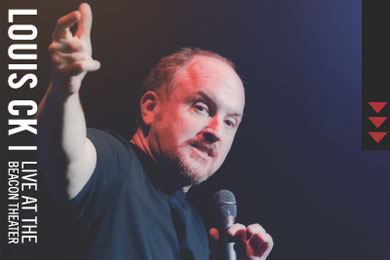
 Comedian Louis C.K. recently earned over $1 million selling a DRM-free comedy special, direct-to-fans from his website for $5. And once again the process gives rise to questions about new business models, piracy and online marketing. Digital Music News publisher Paul Resnikoff offered an insightful overview, “Perhaps the error is to link these accomplishments with developing artists, because creating stardom is now an entirely different game. Heading into this, C.K. had major television exposure, access to shows like Fallon, and an audience that wanted more. That doesn’t diminish the accomplishment, but definitely changes the perspective. Because in the end, Louis’ challenge was less about building fans, and more about satisfying and monetizing the ones he already has.”
Comedian Louis C.K. recently earned over $1 million selling a DRM-free comedy special, direct-to-fans from his website for $5. And once again the process gives rise to questions about new business models, piracy and online marketing. Digital Music News publisher Paul Resnikoff offered an insightful overview, “Perhaps the error is to link these accomplishments with developing artists, because creating stardom is now an entirely different game. Heading into this, C.K. had major television exposure, access to shows like Fallon, and an audience that wanted more. That doesn’t diminish the accomplishment, but definitely changes the perspective. Because in the end, Louis’ challenge was less about building fans, and more about satisfying and monetizing the ones he already has.”
Louis C.K. hired a team to tape and create a video of two performances at the Beacon Theater in Manhattan and then distribute the video directly via a website built for that purpose. According to various reports, within 12 hours, over 50,000 fans had downloaded the video, enough to cover all costs. It took 12 days to reach sales of $1 million.
In a note on his website the artist explained, “The experiment was: if I put out a brand new standup special at a drastically low price ($5) and make it as easy as possible to buy, download and enjoy, free of any restrictions, will everyone just go and steal it? Will they pay for it?”
In a subsequent note (12/13) C.K. detailed costs and revenues for the project pointing out what would have happened if a large company had funded the project.
“…they would have charged you about $20 for the video. They would have given you an encrypted and regionally restricted video of limited value, and they would have owned your private information for their own use. They would have withheld international availability indefinitely. This way, you only paid $5, you can use the video any way you want, and you can watch it in Dublin, whatever the city is in Belgium, or Dubai. I got paid nice, and I still own the video (as do you). You never have to join anything, and you never have to hear from us again.”
Most recently, on Dec. 21 a note appeared on the web site expressing the comedian’s intention to divide the million dollars into four pieces including charities, his production costs, staff and himself.
Will Country Artists Follow This Path?
Is there a lesson or anything new going on here for the music industry? You could answer, “Maybe” to both questions. But with respect to country music we have yet to see an established star dump the label and go direct. Perhaps that’s because inside the Music City format, record sales don’t really mean much for most superstar artists. The real money is earned filling arenas and (for a select few) stadiums. The secret behind accomplishing that task is getting strong support from country radio. Fans don’t follow album sales on SoundScan each week, but they do listen on the airwaves to hear their favorite artists. Can you name a single country artist routinely filling 12,000 seats and up who isn’t getting country radio exposure?
Good managers know where an artist’s bread is buttered and they know who grooms the thoroughbred promotion teams in the race for country radio airplay. Yes, the major labels. So sure, there may be a dozen or so country music artists that could easily make money mirroring the Louis C.K. DTF experiment. But eschewing a major label might also result in short term gain and long term career suicide. Major label support in this format is only about one thing, radio dominance for the country audience. Until that changes, don’t look for artists to fool around with a paltry million dollars at the risk of losing $50 million at the box office.

Category: Artist, Featured, Label, Radio, Sales/Marketing
About the Author
Journalist, entrepreneur, tech-a-phile, MusicRow magazine founder, lives in Nashville, TN. Twitter him @davidmross or read his non-music industry musings at Secrets Of The ListView Author Profile


